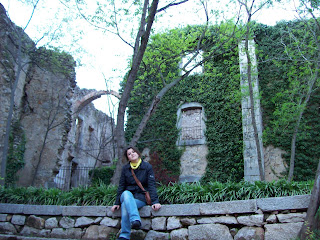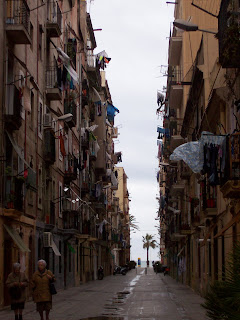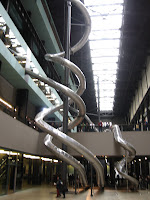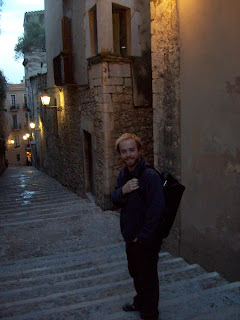
Incredibly my second semester at Leeds is quickly reaching its end. Not winding down, but building to a climactic and frightening finish with a week left of classes and then exams. just for kicks i thought i'd post some of the better things i've read over the past few months. i picked a book from each course that i found enjoyable or most important or the one that leaves an impression. i just found these interesting and thought i'd share. these may not be the best works from each course, but i suppose they are the ones that reached out to me and said, 'look at this, incredible eh?' so i thought i'd pass on the sentiment, maybe just so you know i've done more than travel and maybe so i could get back into the studying mood.
'Between the Acts' by Virginia Woolf
read for modern literature last semester, my first glimpse of virginia woolf. the story of a small town on the day of their town pagent just days before the outbreak of world war II. Interested in History, art, war, sexuality, personal anxiety concerning all of these. blah blah. i became really interested in the connection that woolf builds between words and thought and the way that a single word is packed full of many many connotations beyond itself. words branch out in webs across time and space. thought and speech are not necessarily aligned, or maybe more than we first perceive. i'm now a huge virginia woolf fan.
Article on Foundherentism by Susan Haack
i dont have the actual article in front of me, and the name of it eludes my memory, but i found this article to be a very effective contribution to epistemology; the study of knowledge, what does it mean to say we know something, how do we know something, is this different than belief etc? anyway, there are two competing theories in epistemology, foundationalism and coherentism, both describing different ways in which we gain knowledge. Susan Haack presents a theory of knowledge that combines these two and she cleverly calls it foundherentism (philosophers tend to do this sort of thing). she uses the idea of a crossword puzzle to simulate how we gain knowledge. she looks at our practicle uses of the word knowledge and creates a theory, as opposed to building a theory and attempting to describe how it fits into life.
'The Mill on the Floss' by George Eliot
i read a number of different authors and poets for victorian literature last semester. i can't say a lot of it really appealed to me. the poetry was...a bit tedious, as were some of the books. however, there were some really interesting contributions to literature and when looked at in the context of the period, how people viewed reading etc. some of it is really pretty good. 'the mill on the floss' may not have been the greatest story ever, and there is a lot of criticism, but george eliot (not her real name, and not a man, oh the things you learn) kind of caught my attention because her writing style was really wondering and somewhat philosophical, taking random turns to discuss things not at all important to the story.
'Language Truth and Logic' by A.J. Ayer
philosophy of language. Ayer's book is incredible for many reasons. One, he wrote it when only 24. two, although the position of logical positivism which he backs is no longer popularly accepted, the book is still read as a major contribution to the philosophy of language; (an attempt to say something systematic about language and how we determine meaning). Ayer proposes the idea that in order for a statement to be meaningful it must either be analytic (discoverable a priori, a tautology true by definition, math etc) or empirically verifiable (principle of verifiability) corresponding to something that can be determined through observation of the world. In any case, this leads to the conclusion that any talk of metaphysics (transcendental reality, religious speculation etc.) is essentially meaningless. This drastically changes the face of philosophy if it is accepted. Ayer's book is a straightforward and concise argument that cannot be ignored.
'Dialogues Concerning Natural Religion' by David Hume
David Hume is the arch empiricist of modern philosophy. Essentially, this book is a fictional dialouge between three characters discussing the philosophical foundations of religous belief. The characters all outwardly agree there is a God, however their main discussion revolves around our ability to determine the attributes of this God. In a skeptical approach to the discussion, Hume is attempting to avoid the religous dogma that we all too often fall into. very convincing arguments and a strong introduction to philosophy of religion, i imagine.
'Measure for Measure' or 'The Winter's Tale' by William Shakespeare
or any other play by shakespeare. i know he isn't always associated with a relaxing read, but it really is good. his plays seem to discuss everything and the language really is poetry. the hard part is getting past the first few pages i imagine, but after that it is very easy to be drawn into the play. 17th century hollywood. sex, drugs, murder. exit pursued by a bear.
'Between the Acts' by Virginia Woolf
read for modern literature last semester, my first glimpse of virginia woolf. the story of a small town on the day of their town pagent just days before the outbreak of world war II. Interested in History, art, war, sexuality, personal anxiety concerning all of these. blah blah. i became really interested in the connection that woolf builds between words and thought and the way that a single word is packed full of many many connotations beyond itself. words branch out in webs across time and space. thought and speech are not necessarily aligned, or maybe more than we first perceive. i'm now a huge virginia woolf fan.
Article on Foundherentism by Susan Haack
i dont have the actual article in front of me, and the name of it eludes my memory, but i found this article to be a very effective contribution to epistemology; the study of knowledge, what does it mean to say we know something, how do we know something, is this different than belief etc? anyway, there are two competing theories in epistemology, foundationalism and coherentism, both describing different ways in which we gain knowledge. Susan Haack presents a theory of knowledge that combines these two and she cleverly calls it foundherentism (philosophers tend to do this sort of thing). she uses the idea of a crossword puzzle to simulate how we gain knowledge. she looks at our practicle uses of the word knowledge and creates a theory, as opposed to building a theory and attempting to describe how it fits into life.
'The Mill on the Floss' by George Eliot
i read a number of different authors and poets for victorian literature last semester. i can't say a lot of it really appealed to me. the poetry was...a bit tedious, as were some of the books. however, there were some really interesting contributions to literature and when looked at in the context of the period, how people viewed reading etc. some of it is really pretty good. 'the mill on the floss' may not have been the greatest story ever, and there is a lot of criticism, but george eliot (not her real name, and not a man, oh the things you learn) kind of caught my attention because her writing style was really wondering and somewhat philosophical, taking random turns to discuss things not at all important to the story.
'Language Truth and Logic' by A.J. Ayer
philosophy of language. Ayer's book is incredible for many reasons. One, he wrote it when only 24. two, although the position of logical positivism which he backs is no longer popularly accepted, the book is still read as a major contribution to the philosophy of language; (an attempt to say something systematic about language and how we determine meaning). Ayer proposes the idea that in order for a statement to be meaningful it must either be analytic (discoverable a priori, a tautology true by definition, math etc) or empirically verifiable (principle of verifiability) corresponding to something that can be determined through observation of the world. In any case, this leads to the conclusion that any talk of metaphysics (transcendental reality, religious speculation etc.) is essentially meaningless. This drastically changes the face of philosophy if it is accepted. Ayer's book is a straightforward and concise argument that cannot be ignored.
'Dialogues Concerning Natural Religion' by David Hume
David Hume is the arch empiricist of modern philosophy. Essentially, this book is a fictional dialouge between three characters discussing the philosophical foundations of religous belief. The characters all outwardly agree there is a God, however their main discussion revolves around our ability to determine the attributes of this God. In a skeptical approach to the discussion, Hume is attempting to avoid the religous dogma that we all too often fall into. very convincing arguments and a strong introduction to philosophy of religion, i imagine.
'Measure for Measure' or 'The Winter's Tale' by William Shakespeare
or any other play by shakespeare. i know he isn't always associated with a relaxing read, but it really is good. his plays seem to discuss everything and the language really is poetry. the hard part is getting past the first few pages i imagine, but after that it is very easy to be drawn into the play. 17th century hollywood. sex, drugs, murder. exit pursued by a bear.













